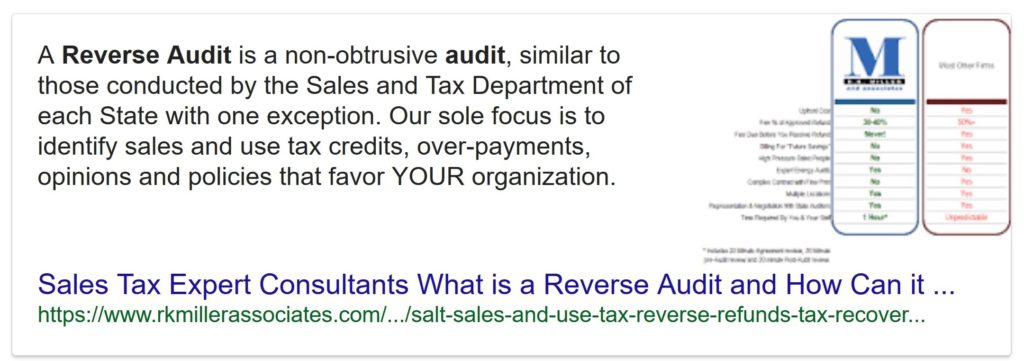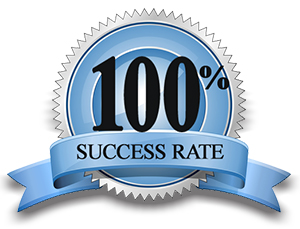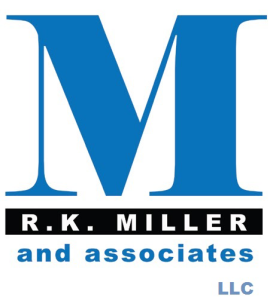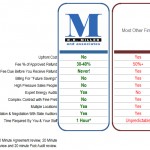Sales and Use Tax Reverse Audit FAQs
Answering FAQs (frequently asked questions) about Sales and Use Tax Reverse Audits.
What is a Reverse Sales Tax Audit?
A Reverse Audit involves a review of your company’s operations and transactions to identify overpaid sales and use tax. Our extensive familiarity with Tax Law enables us to identify exemptions that accountants, CPA’s, tax attorneys and tax departments are often unaware of.
At RK Miller Associates, we identify overpaid tax, submit the claim on your behalf, and defend the claim through the first level of appeals at no additional cost. Learn more about how our process and fees compare to other sales and use tax companies in the industry.
What is the definition of a Reverse Audit?
This is probably the most important of all Reverse Audit FAQs.
View the definition of a sales tax reverse audit:

Can I Do My Own Reverse Audit?
You certainly could. However, every one of our Reverse Audit clients had no idea they were overpaying tax, and all of them had in-house tax departments, CPA’s, accountants, tax attorneys and/or finance teams. If you were to do your own Reverse Audit, you might overlook what could be significant refund or credit potential…and you must be prepared to defend your claim, which takes familiarity with the law and the appeals process.
Can my CPA, Accountant or in-house team conduct a Reverse Audit?
Sales and Use tax is not only complex, it changes frequently, making it very difficult for most financial professionals to keep up on tax law updates, and develop a significant history of experience with gray areas of the tax law. These challenges are why most organizations are unaware when they are overpaying tax.
Cash is king. Yet, every year BILLIONS of capital is overpaid to state tax authorities across the United States and never recovered.
Exemptions, refunds and credits can create a significant loss, or gain, depending on whether you know what to look for, how to file it, and how to defend a refund claim in appeals.
Sales and Use Tax is our specialty. Learn more about our unique advantage in sales tax expertise.
If I’m Under Audit, Why Would I Need a Reverse Audit?
Sales Tax auditors are looking for one thing: revenue for the state in the form of tax, penalty and interest. They are not required (and they have no incentive or reason) to point out overpaid tax, or point out overlooked exemptions. As a result, many organizations end up paying more than they should when an assessment is issued at the close of a sales tax audit.
The Reverse Audit is designed to do one thing: identify and recover overpaid sales and use tax refunds and credits due to YOUR organization before they are lost to the statute of limitations.
How Does a Reverse Audit Work?
The Reverse Audit is conducted by an experienced professional that has been trained to review transactions and financial records in light of current tax law, exemptions and interpretations of gray areas. This typically involves a review of things like accounts payable records, transaction agreements, ledgers, etc. Records of transactions that qualify for a claim for refund or credit are identified and copied for use in filing and defending the claim in appeals, if necessary.
What is the Risk?
There should be no risk involved with a Reverse Audit.
Industry standard is a contingency fee, based on the approved amount of refund or credit. (learn more about what to look for).
As long as fees are not required up front and nothing is charged unless a refund or credit is approved, the company doing the reverse audit takes on all the risk and does the work. All you have to do is provide access to requested documentation and answer questions.
A Reverse Sales Tax Audit is the ONE TIME the emphasis is completely on recovering capital for the organization – and why it is surprising when organizations are hesitant to hire an expert to conduct a reverse audit for them.
Be informed when hiring a company to do a Reverse Audit.
How successful are Reverse Audits?
Success depends on the knowledge of the people conducting the reverse audit. Review in-statute transactions by a trained professional will determine the potential for refund. The more knowledgeable and experienced your sales and use tax company is, the better the chance you have to recover what is owed to you.
R.K. Miller & Associates has a 100% Success Rate, and we offer a Recovery Guarantee for our Reverse Audit clients.
Every company we have conducted a Reverse Audit for and filed a claims for, has, in fact, received a refund and/or credit for overpaid tax.
What Role Does Statute of Limitations Play in Sales and Use Tax Refunds?
The statute of limitations plays a significant role in whether you can recover overpaid sales and use tax. Once that statute has passed, any credit or refund you would have been owed is gone…forever! The statute of limitations for filing is defined by the tax department of each state.
Time is not on your side. With every month and every quarter, billions of overpaid tax is being left behind by organizations that simply had no idea that they were due a refund. Don’t let this happen to you. It is in the best interest of your organization to initiate a Reverse Audit as quickly as possible, and repeat the process every couple of years. Reverse Audits can take time to conduct and prepare for filing. Frequent review and repeat reverse audits are especially important in light of how often sales and use tax laws change across the United States.
Why Do you Mention Appeals?
Once collected, state tax authorities like to hold on to tax revenue, if at all possible. Some tax law requires interpretation. It is not uncommon for the tax department to deny or challenge refund claims. Denial of refunds may easily discourage organizations and financial professionals who have filed a reverse audit.
Experienced experts will not file and submit a refund claim unless they are confident in their ability to substantiate and challenge the tax department, especially in gray area application of tax law.
At RK Miller & Associates, we appeal any and all denials we believe are compliant with tax law we believe we can defend. We don’t give up, even if our clients are discouraged. And, we will fight for our clients for as long as it takes. We have an outstanding success rate in appeals, much to the delight of our clients!
Can a Reverse Audit Trigger a Sales Tax Audit?
The simple answer is No.
The truth is the tax department is one of the most active, and sometimes overwhelmed, departments of a state. Sales tax is often a vital source of revenue, so it is a priority. A refund claim will not on its own trigger an audit.
The volume of sales tax that each state receives annually would probably shock most people. However, sales tax collection is grounded in tax law. However, many businesses, especially businesses with significant taxable revenue, will find themselves under audit at some point. If you are in compliance, a sales tax audit is more of an inconvenience than anything else. The most important rule for sales tax audits is to have a sales tax expert on your side so the best interest of your organization is well-represented.
How to Choose a Reverse Audit Company?
Here are a few guidelines:
- Look for companies that specialize in sales and use tax.
- Never pay up-front (fees should be contingent).
- Compare contingency fees. Reverse Audit fees can range greatly.
- Find a company that won’t charge you “future savings” for showing you how to not overpay in the future.
- Use our checklist on what to look for when hiring a REVERSE AUDIT company.
We hope you find the answers to these FAQs about Reverse Audits helpful.
Don’t see an answer to your question here?
Or, want to see if your organization is a candidate for a Reverse Audit?
Call us! (800) 803-0427
We’ll be happy to answer your questions.
Or submit your question on our contact us page.


